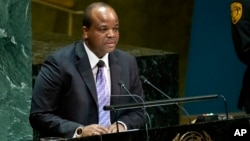Eswatini deployed soldiers and police to multiple schools Monday as students continued to protest for political reforms.
High school students in Africa’s last kingdom have been boycotting classes for the past month.
Among the students’ demands is the release of two lawmakers who were arrested during pro-democracy protests earlier this year.
"The army is not an enemy of the people, and deploying them in schools doesn't mean there is war but just an assistance to the other forces to maintain order," army spokeswoman Tengetile Khumalo said, Agence France-Presse reported.
But Eswatini has been criticized by the international community over the past few months for use of excessive force against protesters. At least 27 people have been killed in clashes with police.
In July, national forces arrested two pro-democracy members of parliament on charges of terrorism for inciting unrest and violating COVID-19 regulations. [[link: https://www.voanews.com/a/africa_arrest-eswatini-lawmakers-condemned-international-community/6208940.html ]]
The arrests of Mthandeni Dube and Mduduzi Mabuza prompted more protests and international condemnation.
Some information in this report came from Agence France-Presse.













